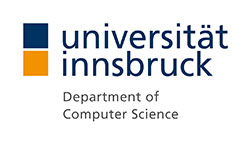We make the measurability of our R&D results one of our primary tasks. We want to show to the world that semantic technologies are becoming reality. Find out more about our results and our spin-off companies.
Austria takes central stage in World Internet Revolution
The Digital Enterprise Research Institute (DERI) in Innsbruck is bringing some of the world's top researchers in Computer Science to Austria to discuss the next generation of Internet technology - the Semantic Web. This new Semantic Web will make computers better understand information, and could potentially save billions in worldwide IT spending.
The Digital Enterprise Research Institute will host a prestigious "invitation only" workshop to discuss this revolutionary new technology. DERI is organising this gathering alongside the World Wide Web Consortium (W3C). The W3C is the driving force behind the development of the Internet, and is directed by Sir Tim Berners-Lee, the inventor of the Web. Semantic Web Services Week (as the event is called) will further establish DERI, and the University of Innsbruck as a major driving force in this world wide technological field.
According to Prof. Dr. Dieter Fensel, the Scientific Director of DERI, "This is tremendously important and exciting for Innsbruck and Austria. This places us right up there amongst the leading institutes in the world for this technology. The potential spin-offs are huge. The Semantic Web and Semantic Web Services has the potential to radically alter the way we use computer and internet technology. It aims to make computers better understand information, and to enable computers to cooperate "more intelligently" with each other. It is a very exciting time to be a researcher in this field."
With present Internet technology, so much information is out there, that it can be very difficult to find what you are looking for. You only have to type a word into Google and you get millions of "hits" back. If you want to find YOUR information, you then have to trawl through all the information that the computer presents to you, and then decide for yourself what is useful and what is not. The search engine does not understand the meaning of words; All it does is look for web pages containing the words you typed, and lets you decide if it is meaningful or not. However if a computer could better understand the meaning of words, it could sort out the relevant information from the garbage. The Semantic Web will enable computers to do just that.
Also with the present Internet, it is also very difficult for computers to cooperate with one another. For example, Web Services are computer programs that offer some service to other computer programs over the internet. However computers currently have huge difficulty recognising the right services and talking to each other. Two computers can only "talk" if someone tells them exactly what to communicate to each other. They do not understand the information that they are sharing, and each cooperation needs to be aligned by people. However if computers could be made to understand the services offered by other computers, they could cooperate without us telling them beforehand. Semantic Web Services are services that computers can understand and use without human intervention.
The event hosted by DERI will bring together Computer Science Researchers from around the world to discuss these emerging technologies which could finally allow computers to "think" more like people.
This event is organized in co-operation with Trans-IT, the Austrian ministry for innovation and technology, the Austrian Computer Society, and the EU funded projects ASG, DIP, KnowledgeWeb and SEKT.
Contact person in charge.

